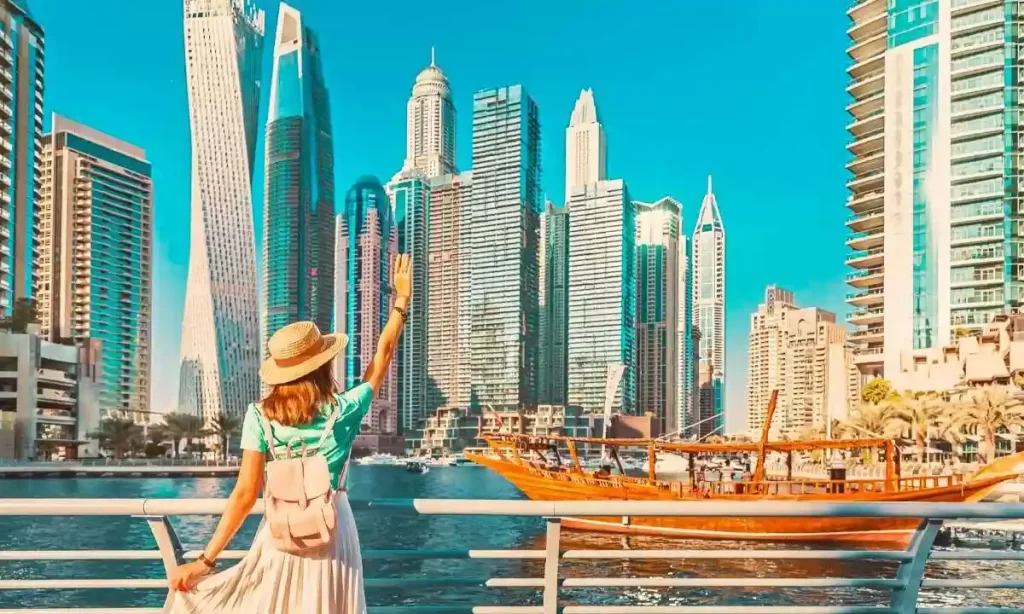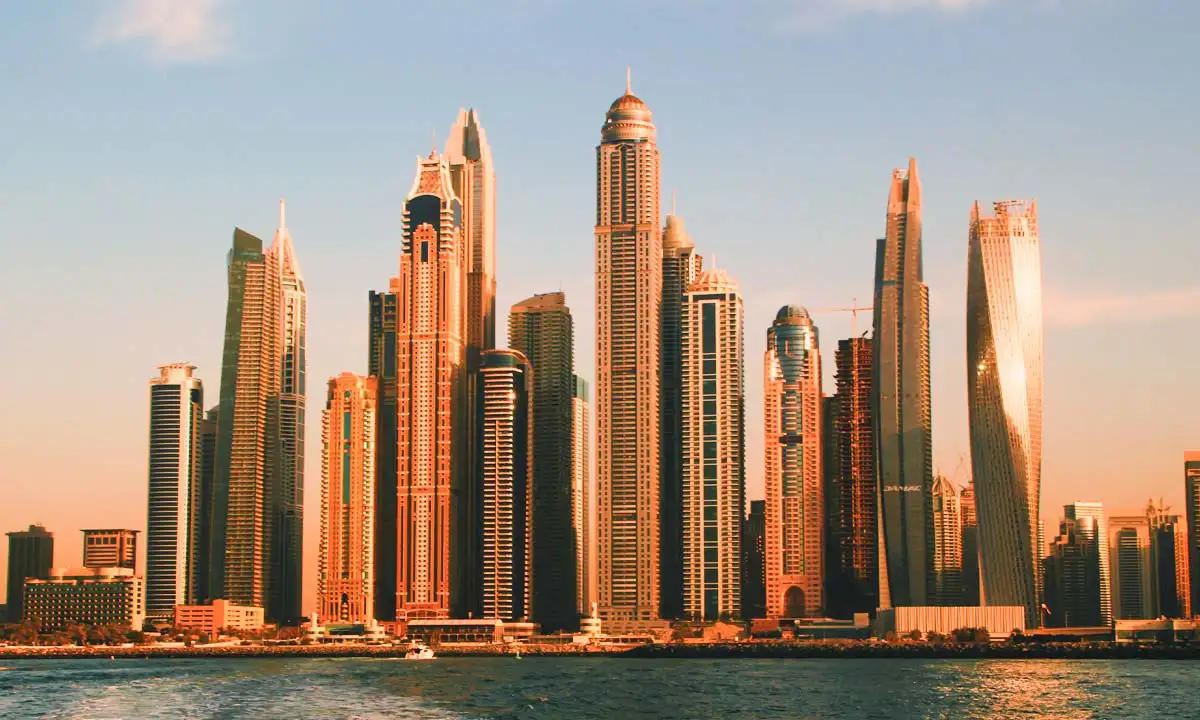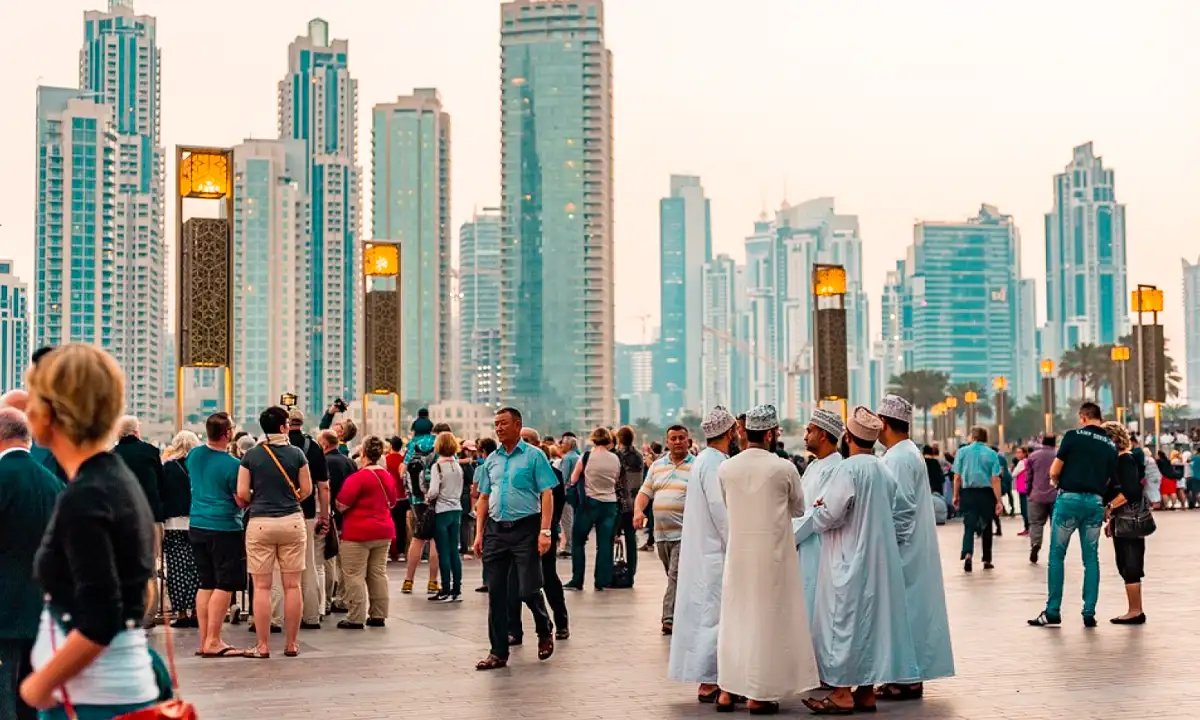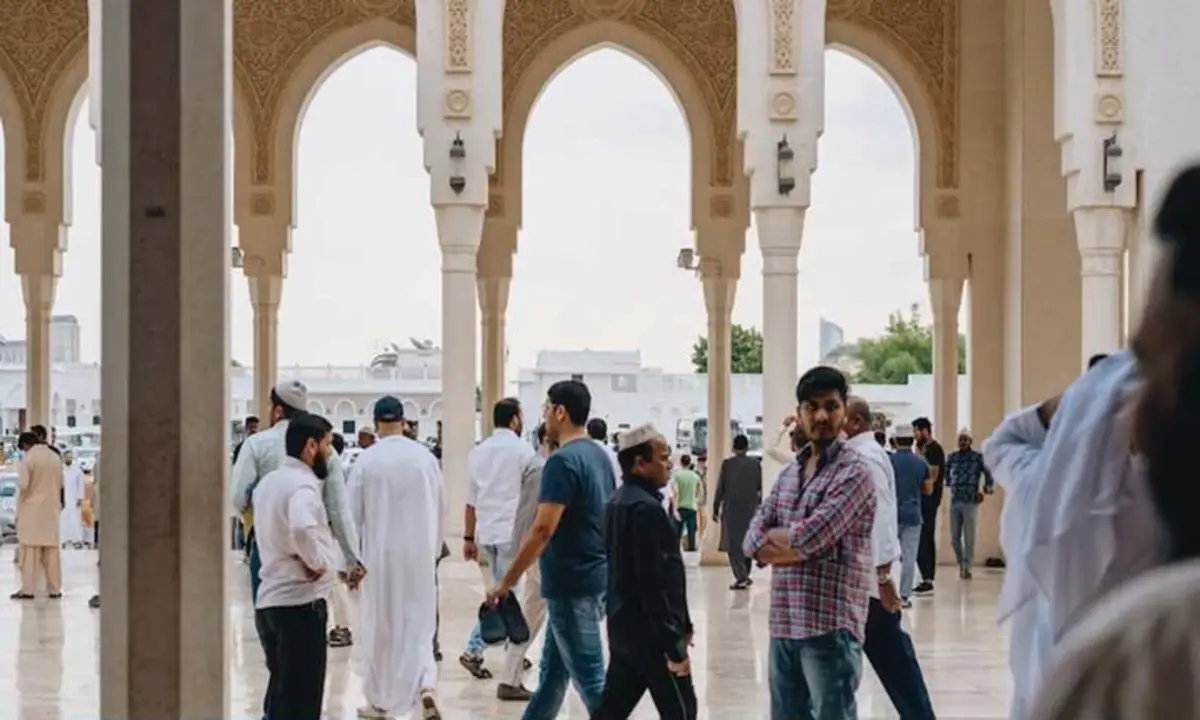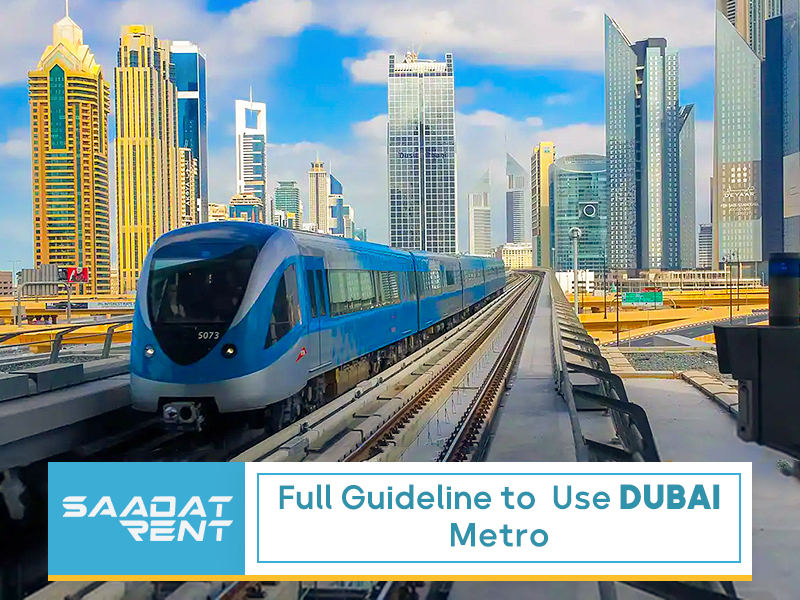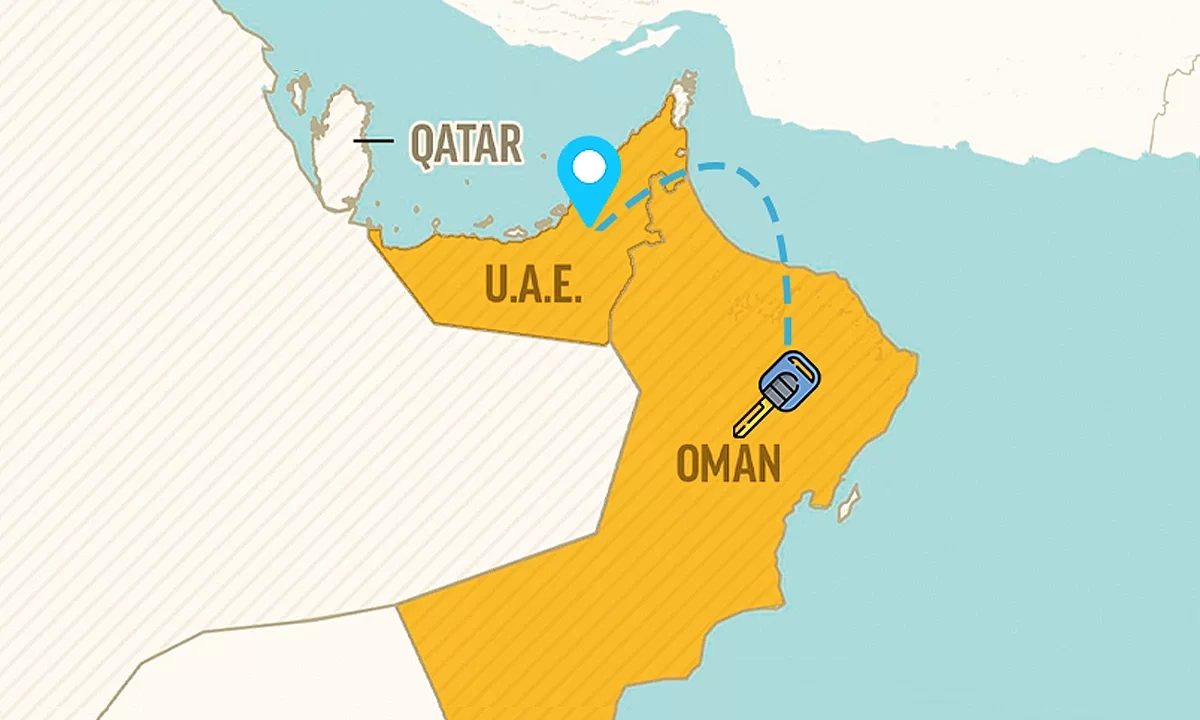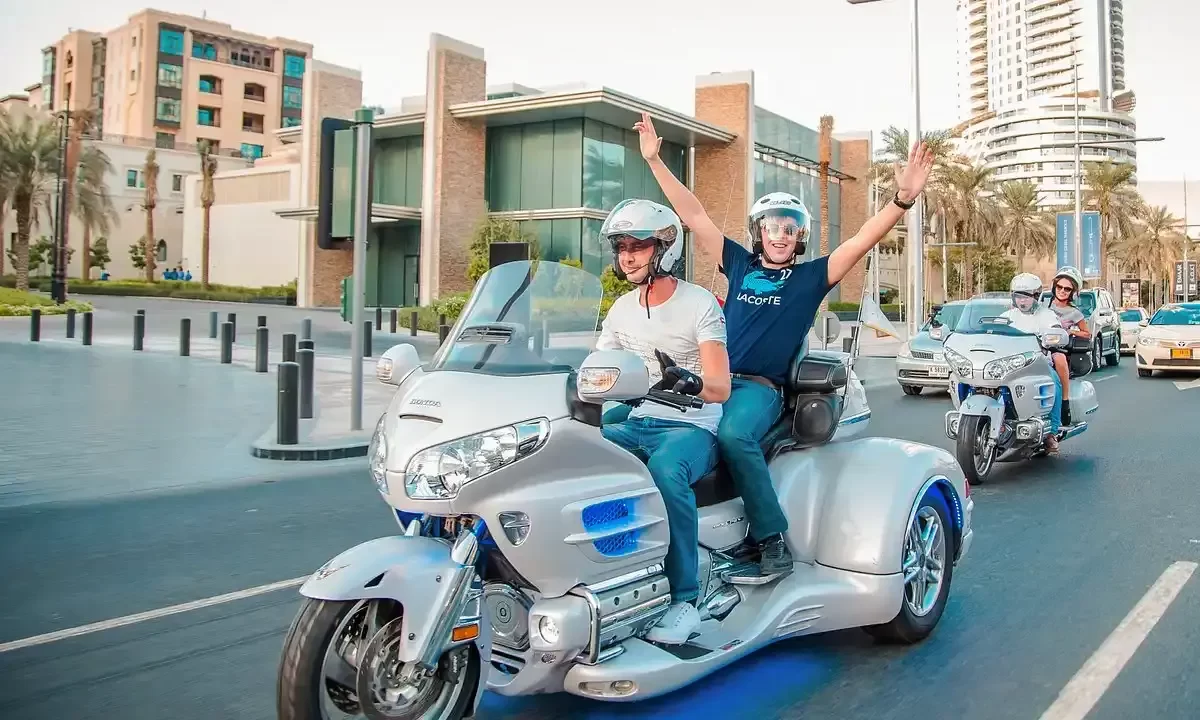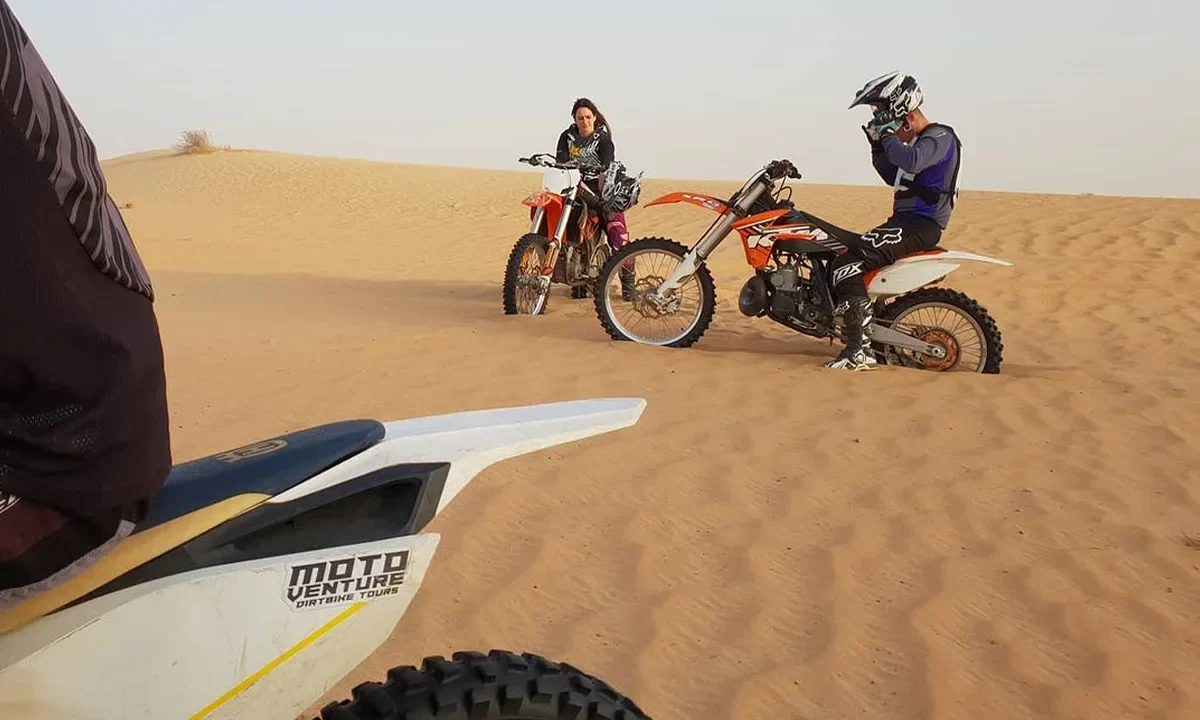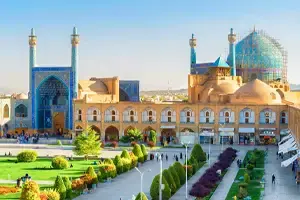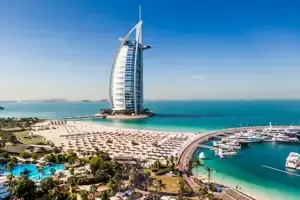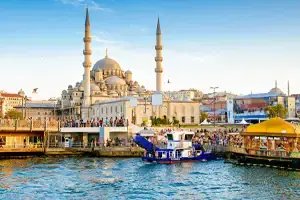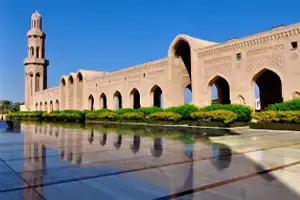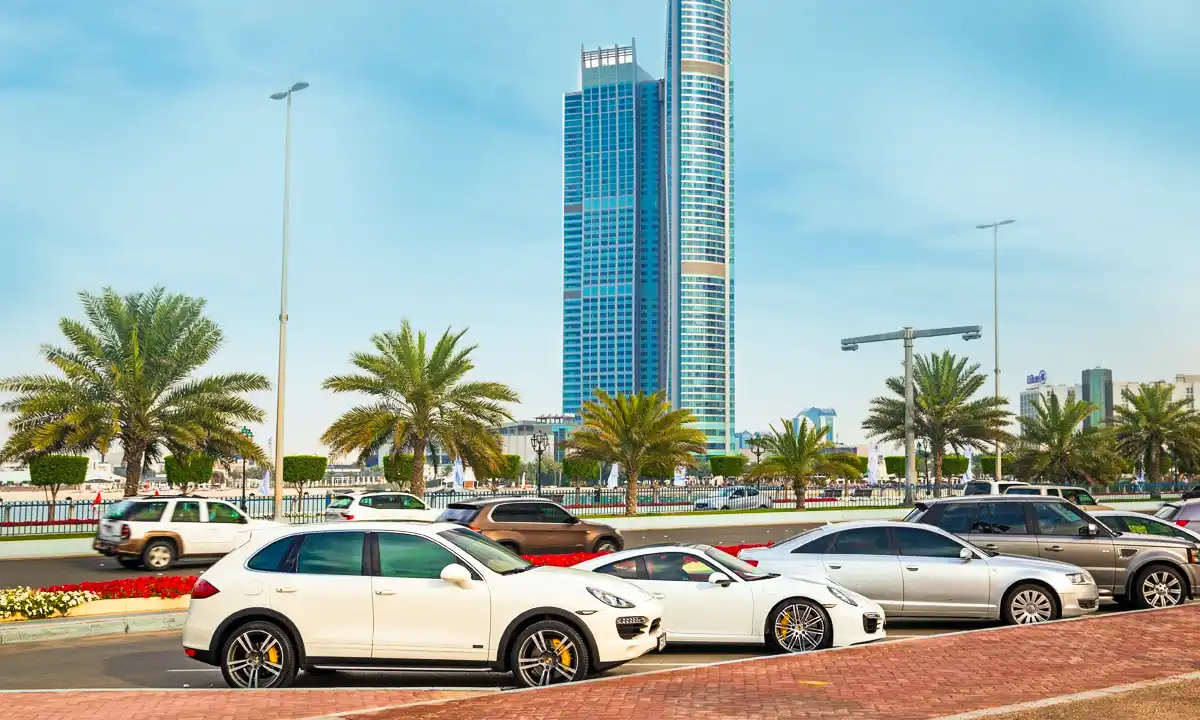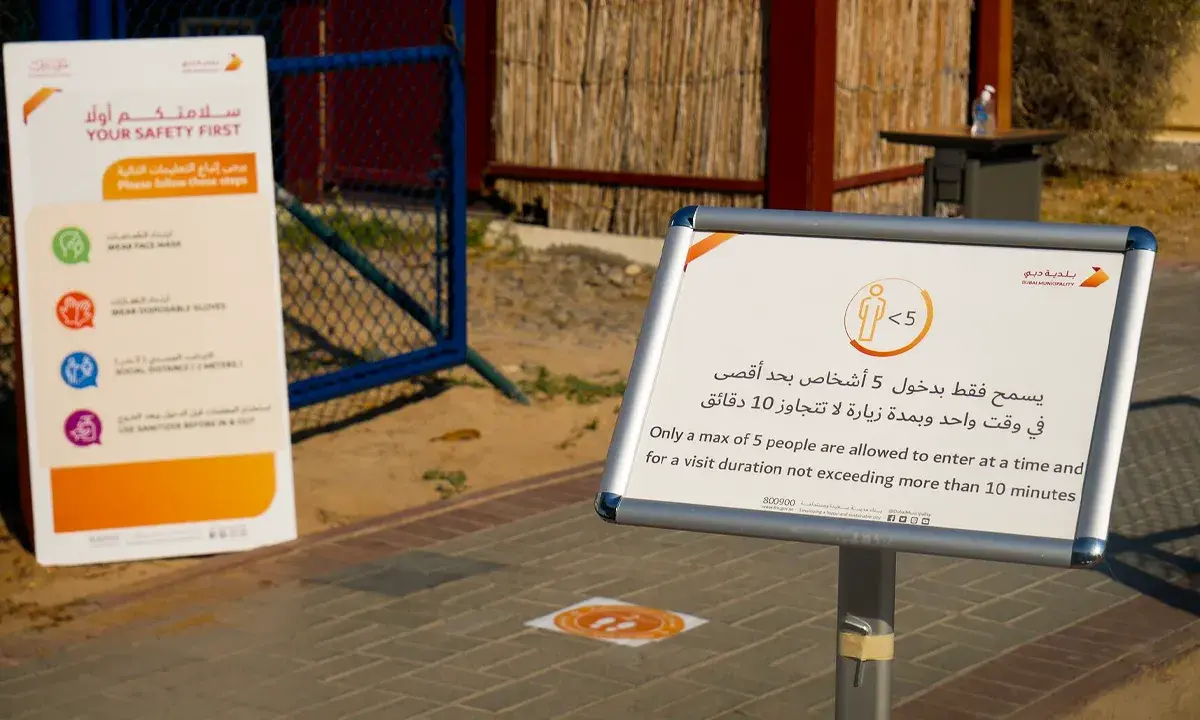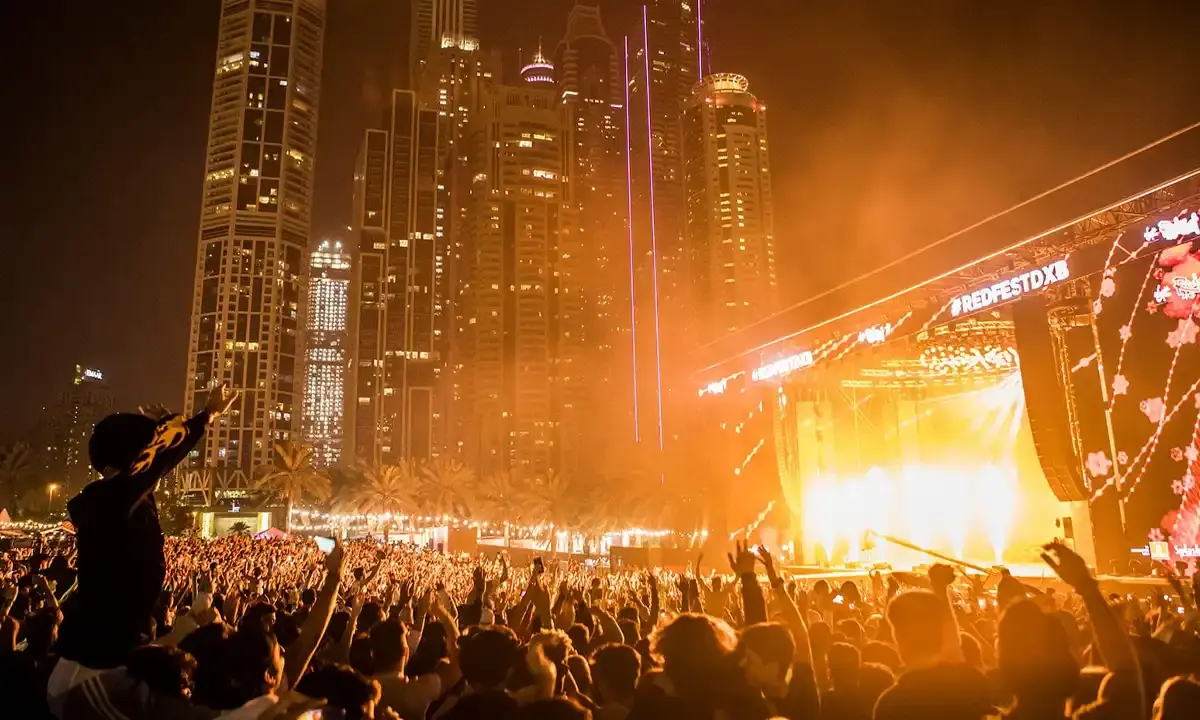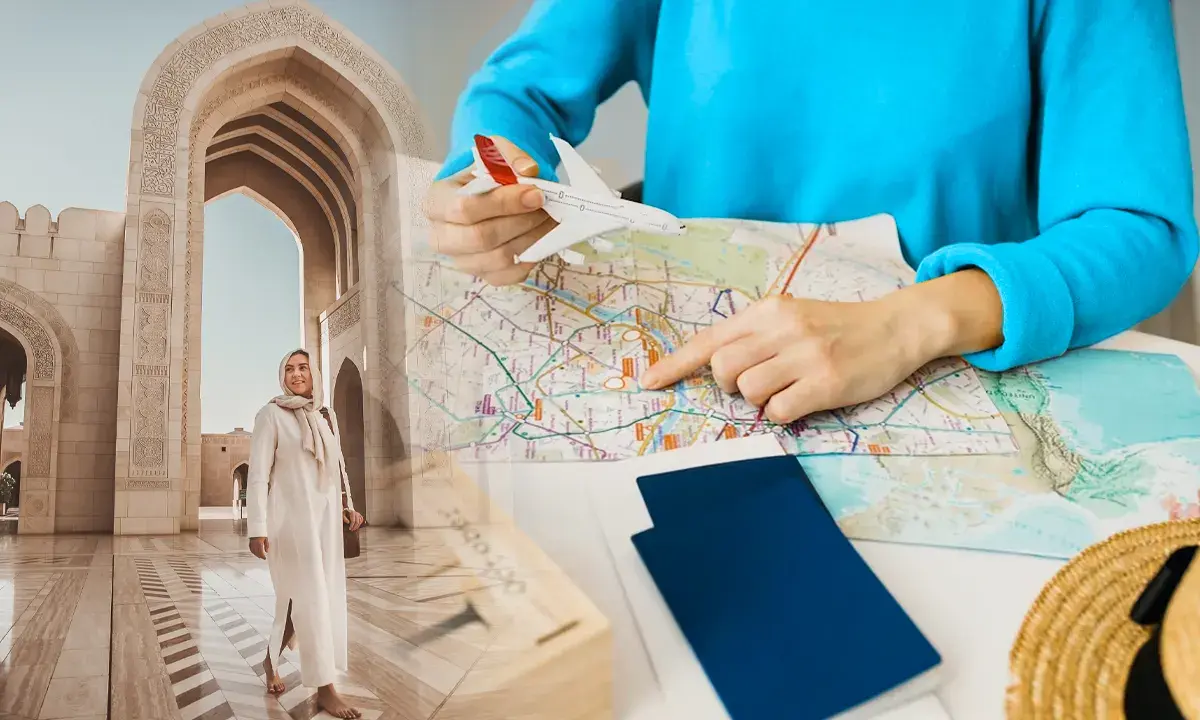Welcome to your essential travel tips for Dubai in 2024. I’m Alirezaa, and having lived in Dubai for some time, I’ve compiled this guide filled with practical tips and updates to help you navigate this dynamic city. Dubai stands out as a beacon of modernity and innovation, balanced with its rich traditional heritage. As the city strides towards becoming the most visited destination by 2025, I’m here to provide you with the most current and useful information to make your visit both enjoyable and seamless. Let’s dive into the essential tips for experiencing Dubai in 2024.
Table of Contents
About Dubai
Dubai, one of the seven emirates of the United Arab Emirates (UAE), serves as the perfect introduction to both the historical and futuristic facets of the Middle East. If it’s your first time, prepare to be dazzled. On one hand, there’s the majestic Burj Khalifa piercing the sky and the expansive Dubai Mall offering a world-class shopping spree. On the other, you’ll find yourself lost in the aromatic alleyways of traditional souks and enchanted by the timeless charm of the Al Fahidi Historic District. Newcomers shouldn’t miss a desert safari, reminiscent of Dubai’s Bedouin roots, or the opportunity to witness the architectural marvel that is Palm Jumeirah. With its harmonious blend of old-world culture and modern-day luxuries, Dubai promises first-time visitors an unforgettable journey of discovery.
History: Ancient Times, Originally a small fishing village and a hub for pearl diving.
Modern Era, Rapid development began in the 20th century, especially after the discovery of oil in the 1960s.
Size: Approximately 4,114 square kilometers (1,588 square miles).
Dubai time zone
Dubai is situated in the United Arab Emirates Standard Time zone, which is abbreviated as UAE. The time offset is UTC+4. Dubai does not observe daylight saving time, so the time offset remains consistent throughout the year.
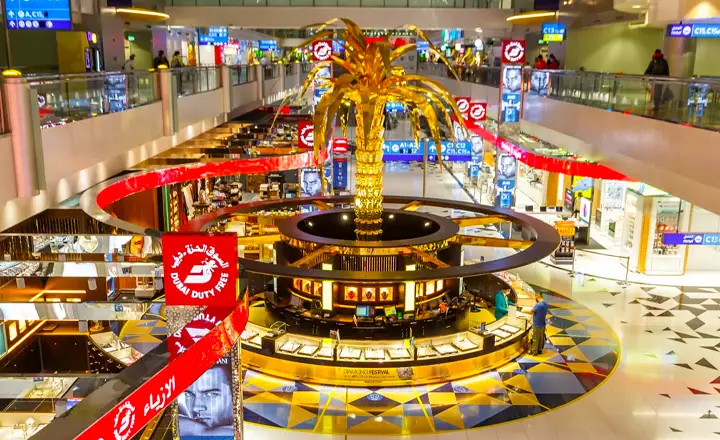
Best Time to Visit Dubai
When considering a trip to Dubai, timing can mean the difference between a comfortable sightseeing experience and braving blistering temperatures. Delving into the best time to visit Dubai requires an understanding of its desert climate, annual events, and how they might impact your itinerary.
- Dubai Climate Overview
Dubai has a hot desert climate with two main seasons, cool and hot.
Cool Season (November to March): Temperatures during these months range between 17°C (63°F) at night and 30°C (86°F) during the day. The weather is pleasant, with clear skies and occasional rainfall.
Hot Season (April to October): This period sees temperatures often soaring above 40°C (104°F). Humidity levels rise, particularly during June to August.
- Dubai Tourist Peaks
High Tourist Season (November to March): Thanks to the agreeable weather, this is the peak tourist season. Accommodation rates can be higher, and attractions more crowded. However, it’s the best time for outdoor activities such as desert safaris, beach outings, and rooftop dining.
Low Tourist Season (April to October): The scorching heat means fewer tourists, leading to lower accommodation rates. Indoor activities, such as visiting malls, indoor ski slopes, and aquariums, become more popular.
- Dubai Events and Festivals
Dubai Shopping Festival (DSF): Taking place in January and February, DSF attracts shoppers from around the world with its huge discounts, raffles, and entertainment.
Dubai Food Festival (February to March): A gastronomic delight, this festival showcases Dubai’s diverse culinary scene with events spread throughout the city.
Dubai Summer Surprises (July to August): Designed to attract tourists during the hot months, this festival offers discounts in malls, children’s events, and indoor entertainments.
- Dubai Outdoor Activities
If you’re looking to explore the city’s beaches, dunes, and outdoor attractions:
Beaches are best enjoyed from November to March when the sun is bearable, and the waters are cool and refreshing.
Desert Safaris: Cooler months are ideal for dune bashing, sandboarding, and nighttime desert events.
- Cost Implications
Visiting during the high tourist season might mean higher prices for accommodations, but you’ll also get to experience Dubai in its full splendor. On the other hand, braving the heat could save you some dirhams, especially in hotels.
- Ramadan
Ramadan, the holy month for Muslims, sees a change in the city’s rhythm. Eating, drinking, and smoking in public during daylight hours is prohibited, and many restaurants remain closed until sunset. However, experiencing Dubai during Ramadan offers a unique cultural insight, with nightly feasts and special events.
While the cool season from November to March is widely regarded as the best time to visit Dubai, every period offers something unique. Align your trip with your interests, be it shopping, food, culture, or outdoor activities, and you’ll have a memorable Dubai experience.
Accommodation – best places to stay
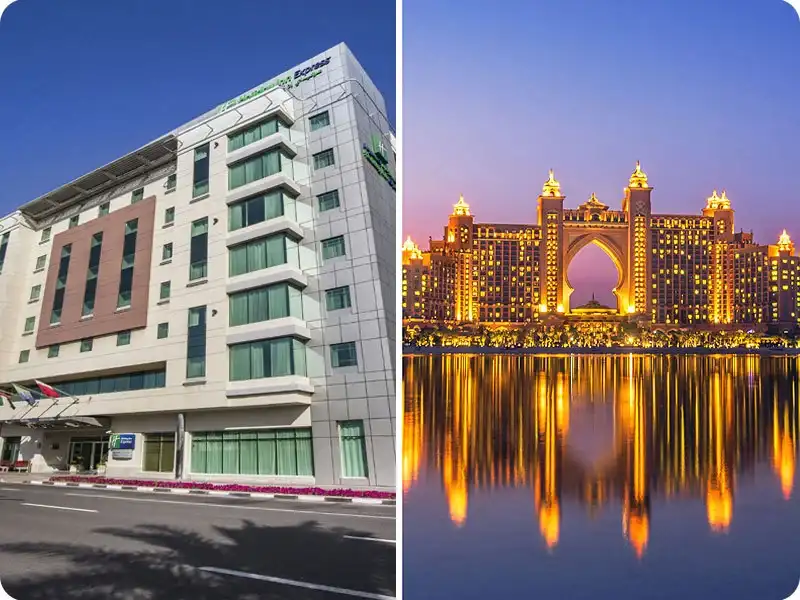
- Luxury Hotels
Dubai is famed for its opulence and luxury accommodations. These hotels often come with world-class amenities, spas, pools, gourmet restaurants, and concierge services.
Examples: Burj Al Arab, Atlantis The Palm, Armani Hotel, and Jumeirah Beach Hotel.
- Budget Hotels:
These are more affordable options for those watching their expenses. While they may not offer the extravagance of the luxury category, many still provide good facilities and comfort.
Examples: Rove Hotels, Ibis, and Holiday Inn.
- Hostels
Ideal for backpackers or solo travelers, hostels in Dubai offer shared accommodations and are a great way to meet fellow travelers.
Examples: Backpacker 16 Hostel, At The Top Hostel.
- Serviced Apartments
These are fully furnished apartments available for short-term or long-term stays. They combine the comforts of home with hotel-like amenities.
Examples: Grosvenor House, Dusit Residence.
Areas to Stay
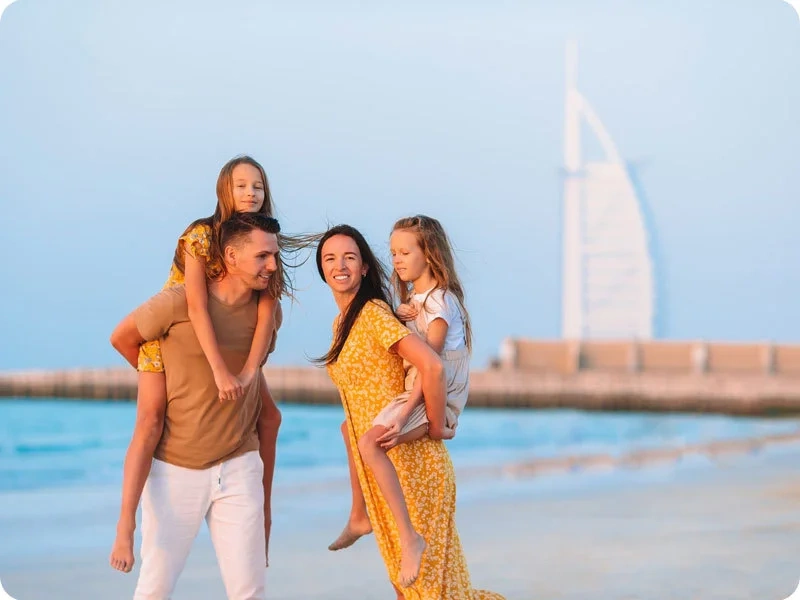
📍Downtown Dubai
Home to the iconic Burj Khalifa, Dubai Mall, and Dubai Fountain. This area is the city’s bustling heart, offering a mix of leisure, shopping, and entertainment.
Best for First-time Dubai visitors and those keen on shopping and major attractions.
📍Marina
A modern neighborhood known for its impressive skyline, waterfront, and the Dubai Marina Walk – a bustling area filled with restaurants and cafes.
Best for Those looking for a vibrant nightlife and proximity to beaches.
📍Palm Jumeirah
is A man-made island offering luxurious resorts, beach clubs, and stunning ocean views.
Best for Travelers seeking beach resorts and a more laid-back vibe.
📍Old Dubai (Deira & Bur Dubai)
The historic center of Dubai, offering traditional souks, heritage buildings, and a glimpse into the city’s past.
Best for Culture enthusiasts and budget travelers.
Walking in Dubai
If you want to save money or walk the streets of Dubai and connect more with the people of this city, instead of using cars and other means of transportation, you can walk short distances. Of course, remember that Dubai is a hot and dry city. Walking is tolerable from December to March, but from April to November the temperature is high and the heat of the city becomes annoying.
Booking Tips | 5 booking tips for visitors
- Plan Ahead: Dubai is a popular tourist destination. Booking accommodations in advance, especially during peak seasons, can get you better deals and ensure availability.
- Check for Deals: Many booking platforms like Booking.com, Agoda, and Airbnb regularly offer deals or discounts. Keep an eye out for special promotions.
- Consider Location: Given Dubai’s sprawling nature, staying close to your primary areas of interest or near the metro can save time and transport costs.
- Read Reviews: Platforms like TripAdvisor offer firsthand reviews from other travelers. This can give insight into the quality of service, cleanliness, and overall experience.
- Understand Local Regulations: For platforms like Airbnb, ensure that the listing complies with Dubai’s regulations for short-term rentals.
Language
Official Language: Arabic
Arabic is the official language of the United Arab Emirates (UAE), of which Dubai is a part. The Arabic script, which is written from right to left, is also used for a number of other languages across the Middle East.
Dialect: The variety of Arabic spoken in Dubai is Gulf Arabic or Khaleeji. While it shares many commonalities with Standard Arabic, there are local colloquialisms and phrases that may be unique.
Commonly Spoken Languages
English: Given Dubai’s status as a global business hub and its influx of expatriates and tourists, English is widely spoken. Most signs are bilingual, with Arabic and English text. Additionally, many businesses, especially in the service and tourism sectors, operate primarily in English.
South Asian Languages: Due to a significant number of expatriates from the Indian subcontinent, languages like Hindi, Urdu, Malayalam, and Tamil are commonly heard.
Tagalog: With a sizeable Filipino community in Dubai, Tagalog is also frequently spoken.
Tips for Travelers
- Learn Basic Arabic Phrases: While not essential, knowing basic greetings or phrases in Arabic can be a sign of respect and can be appreciated by locals. For instance:
Hello: مرحبا (Marhaba)
Thank you: شكرا (Shukran)
- Language Apps: Travelers can download language apps or phrasebooks to help with translation and basic communication. Google Translate or Duolingo are good options.
- Cultural Nuances: Language is deeply tied to culture. In Arabic, many phrases and expressions are intertwined with Islamic traditions and local customs. For instance, the phrase “Insha’Allah” (إن شاء الله) meaning “God willing” is often used to express hope for a future event or occurrence.
| English | Arabic | Phonetic Pronunciation | Usage/Notes |
|---|---|---|---|
| Hello | مرحبا | Marhaba | Greeting |
| Thank you | شكرا | Shukran | Expression of gratitude |
| Please | من فضلك | Min fadlak (m)/ fadlik (f) | Polite request |
| Yes | نعم | Na'am | Affirmation |
| No | لا | La | Negation |
| Goodbye | وداعا | Wadaeaan | Farewell |
| Excuse me | عفوا | Afuwan | Getting attention/ apologizing |
| How much? | بكم هذا؟ | Bikam hadha? | Asking price |
| Bathroom | حمام | Hammam | Locating restroom |
| Water | ماء | Ma'a | Basic necessity |
| Help! | مساعدة! | Musa'ada! | Emergency |
Currency in Dubai: An In-depth Exploration
Dubai, being one of the global hubs for commerce, tourism, and luxury, operates with a currency that mirrors its stature in the world economy. The official currency of Dubai and the rest of the United Arab Emirates is the Dirham, abbreviated as AED (United Arab Emirates Dirham).
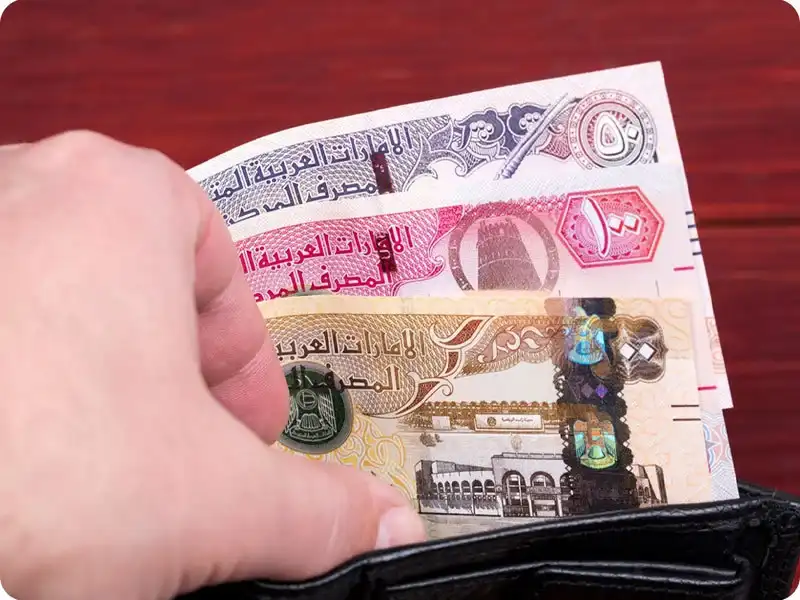
The Dirham is subdivided into 100 smaller units called fils. When visiting, you’ll commonly come across coins denominated in 25 fils, 50 fils, and 1 dirham. Banknotes, on the other hand, range from denominations of 5, 10, 20, 50, 100, 200, and 500 to the high-value 1000 dirham note.
For travelers, understanding the currency’s exchange rate against their home currency is crucial. The Dirham’s value is pegged to the US Dollar, with an approximate rate of 3.67 AED to 1 USD, making it relatively stable. However, it’s always wise to check real-time rates before any significant financial transaction.
Dubai boasts a modern and expansive financial infrastructure. Credit and debit cards (especially Visa and MasterCard) are widely accepted across hotels, restaurants, malls, and other commercial establishments. However, smaller shops or street vendors in traditional souks might prefer cash. It’s advisable to carry a mix of both cards and cash for convenience.
ATMs are ubiquitous in Dubai. They can be found in malls, near tourist attractions, and throughout the city. These machines offer services in multiple languages and provide cash withdrawal in AED. Many of them also accept international cards, but it’s prudent to be aware of transaction fees or conversion rates that might apply.
While the city is remarkably advanced in terms of digital transactions, haggling in markets is a deep-rooted tradition. In such scenarios, cash can be advantageous. Moreover, when dealing with taxis or small vendors, having smaller denominations is helpful to facilitate easy transactions.
Dress Code in Dubai: A Closer Examination
Dubai, as a metropolis, stands at a fascinating crossroads between the traditional and the contemporary, and this dynamic is profoundly reflected in its approach to dress codes. While the city is indisputably more liberal compared to some of its regional counterparts, understanding and respecting its dress norms is vital for visitors.
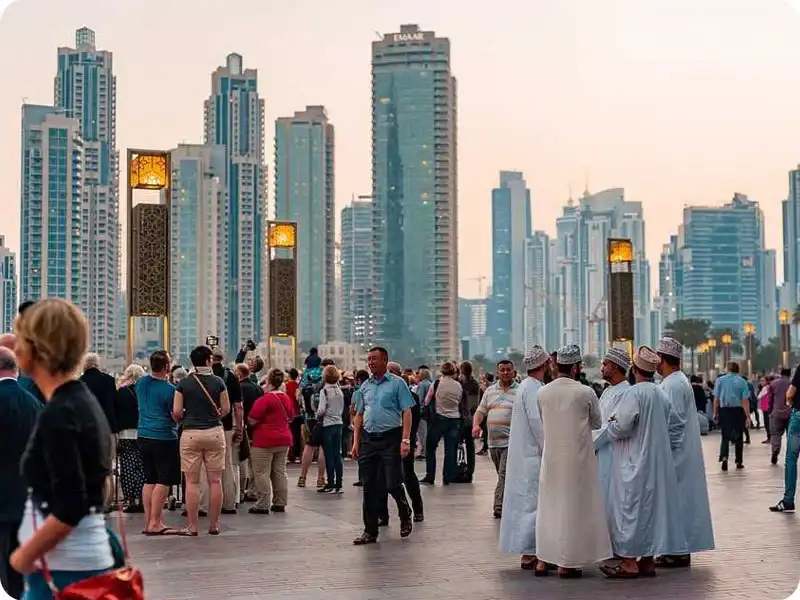
At its core, the Emirati culture upholds modesty, particularly in attire. Traditionally, Emirati men wear a ‘kandura’ or ‘dishdasha’ – a white, ankle-length robe, while women wear an ‘abaya’ – a black flowing cloak, often paired with a ‘sheyla’ or ‘hijab’ to cover the head. As a traveler, you’re not expected to adopt these traditional attires, but understanding the essence of modesty behind them can guide your wardrobe choices.
In public places like malls, restaurants, or streets, it’s advisable for both men and women to wear clothes that cover the shoulders and knees. For women, sleeveless tops, short skirts, or dresses might be acceptable in resort areas but are less appropriate in more conservative settings. Men should typically avoid wearing sleeveless shirts in public areas.
Beaches and hotel pools often adopt a more Western approach. Swimwear, such as swimsuits and trunks, are acceptable at these locations. However, it’s crucial to switch back to modest clothing when leaving these areas. Topless sunbathing is not permitted, and thong-style swimsuits are best avoided.
Dubai’s numerous mosques are emblematic of its deep-rooted Islamic culture. If you plan on visiting one, women are usually required to cover their heads, and both genders should wear attire that covers the arms, legs, and body. Some mosques provide visitors with clothing that meets their requirements.
Nightlife in Dubai is vibrant, and many upscale clubs, bars, and restaurants might have a more relaxed dress code, with patrons often dressed in trendy and stylish wear. However, excessively revealing outfits might still be frowned upon.
In essence, dressing in Dubai is all about understanding the context. While the city embraces modernity and is accustomed to international visitors, a measure of cultural sensitivity can go a long way. By observing and respecting local norms, travelers can enjoy a seamless experience in this Arabian gem, feeling comfortable and welcome in any setting.
Transportation in Dubai – tips for moving around
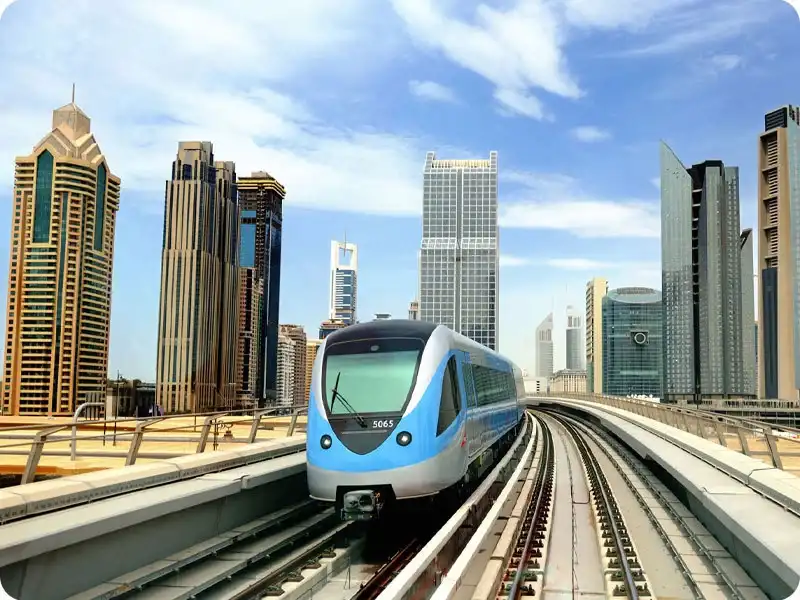 In my opinion and from personal experience, renting a car in Dubai is the most convenient and cost-effective transportation option for visitors and travelers. It provides unmatched flexibility and freedom to explore the city at your own pace, making it ideal for those who want to venture beyond the usual tourist spots. This option often proves to be more economical, especially for longer stays or group travel, compared to frequently using taxis or ride-hailing services. Other methods are:
In my opinion and from personal experience, renting a car in Dubai is the most convenient and cost-effective transportation option for visitors and travelers. It provides unmatched flexibility and freedom to explore the city at your own pace, making it ideal for those who want to venture beyond the usual tourist spots. This option often proves to be more economical, especially for longer stays or group travel, compared to frequently using taxis or ride-hailing services. Other methods are:- Dubai Metro
Overview: Launched in 2009, the Dubai Metro is one of the longest driverless metro networks in the world. It’s a convenient, efficient, and affordable way to navigate the city.
Lines: The metro primarily consists of two lines: the Red Line and the Green Line. Both lines connect several major tourist spots, malls, and business districts.
Tickets: You can purchase tickets at the station or use a rechargeable Nol card, which can also be used for other forms of public transport. There are different zones, and the fare depends on how many zones you cross.
Timings: The Metro typically runs from around 5 AM to midnight during the week, with extended hours on weekends. However, always check the latest schedules.
- Taxis
Overview: Taxis are an integral part of Dubai’s transportation system. They’re plentiful, metered, and offer a convenient way to travel short or long distances.
Companies: While there are several taxi companies in Dubai, they all operate under the regulation of the Roads and Transport Authority (RTA). You can recognize RTA taxis by their cream color and varied roof colors representing different operators.
Ride-hailing Apps: Careem and Uber are widely used in Dubai and offer another option for visitors. The experience is similar to using these apps in other major cities, with the added benefit of cash or card payment options in Careem.
- Buses & Water Taxis (Abras)
Buses: Dubai’s extensive bus network serves nearly every part of the city. Buses are air-conditioned (a blessing in the summer heat) and are an affordable way to travel, especially to areas not serviced by the metro. The main bus stations are Al Ghubaiba and Gold Souk, and you can use the Nol card for fare payment.
Water Taxis (Abras): These traditional wooden boats offer a unique and scenic way to travel, especially between Deira and Bur Dubai. They’re particularly popular for crossing the Dubai Creek. Abra rides are not only economical but also provide a glimpse into Dubai’s maritime heritage. Additionally, more modern water taxis operated by the RTA offer routes along Dubai Creek and the coastline.
- Rental Vehicle Dubai
In the sprawling metropolis of Dubai, where modern skyscrapers meet historic neighborhoods, renting a vehicle in Dubai emerges as a notably efficient and affordable transportation choice for visitors. With its state-of-the-art road infrastructure, the city is a driver’s dream, offering both accessibility and ease of navigation. Visitors can appreciate the freedom that comes with a rental vehicle, allowing for spontaneous detours to charming local eateries or unlisted attractions, setting their own pace without being bound by public transport schedules. This method becomes especially cost-effective for group travelers or families, who can often find that the combined cost of individual public transport tickets exceeds that of a day’s car rental. Dubai’s rental market caters to diverse preferences, from luxury SUVs to compact cars, ensuring there’s a perfect fit for every traveler’s budget and style. Furthermore, those who venture beyond the city’s boundaries, perhaps to the scenic Hajar Mountains or the neighboring emirate of Abu Dhabi, may find a rented vehicle valuable. While the rental process in Dubai is streamlined, with many companies even offering convenient pick-up and drop-off services, it’s imperative for visitors to familiarize themselves with local traffic rules and parking nuances to ensure a smooth journey.
Essential Documents for Visitors
When planning a trip to the illustrious city of Dubai, ensuring that all required documentation is in place is of utmost importance for a seamless travel experience. To begin with, every traveler must possess a passport that is in good condition and has at least six months of validity from the date of entry into Dubai. Visa requirements for the UAE vary depending on nationality. Citizens from certain countries, including most European Union nations, the USA, Canada, Australia, and several others, enjoy the privilege of obtaining a visa on arrival, generally valid for 30 days with a potential for extension. However, many other nationalities must secure a visa in advance. This pre-arranged visa can be procured online, via UAE embassies, or through certain airlines. Moreover, acquiring most pre-arranged visas demands having a sponsor, which can be a UAE-based airline, registered hotels and tourist companies in the UAE, or even relatives and residents living within the country. It’s noteworthy that citizens from the Gulf Cooperation Council (GCC) countries have the luxury of visa-free travel to the UAE. Beyond visas, travelers should be prepared to present proof of a return or onward ticket, ensuring they don’t overstay. Details of confirmed accommodation, serving as an address during the stay, can also be beneficial. Finally, while not a strict mandate, travelers are advised to possess travel insurance, especially with coverage for medical emergencies, considering the potentially high medical expenses in Dubai.
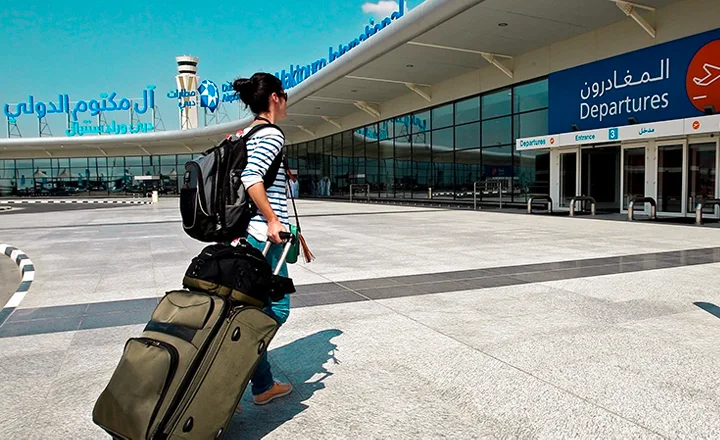
Note: Charger for electrical appliances
Another thing to consider when traveling to Dubai is charging electronics. The voltage of electricity consumption in Dubai is 220 to 240 volts and its power sockets have three branches. So be sure to bring a triangular converter with you on the trip.
Safety and Health – you need to know
General Safety Tips
- Respect Local Laws and Customs: Dubai is a part of the UAE, which is a Muslim-majority country with laws that might be different from Western norms. For instance, public displays of affection should be kept minimal.
- Dress Modestly: Especially in religious sites and older parts of the city. Women should cover their shoulders and knees, and men should avoid wearing shorts in these areas.
- Avoid Overconsumption of Alcohol: While alcohol is available in licensed venues, public intoxication is frowned upon and can lead to fines or imprisonment.
- Stay Hydrated and Sun-Protected: The desert climate can be deceptively draining. Always carry water, wear sunscreen, and wear a hat or sunglasses when outdoors.
Common Scams to Avoid
- Fake Goods: There might be vendors selling counterfeit luxury goods or electronics. Always purchase from reputable sources.
- Overcharging Taxis: Always insist on the meter being turned on or pre-agree on a fare.
- Street Hustlers: Be cautious of anyone trying to sell you something on the streets, especially if it seems too good to be true.
- Health Precautions and Vaccinations
- Vaccinations: No specific vaccines are required for Dubai. However, it’s wise to be up-to-date on routine vaccines like measles, mumps, rubella, and seasonal flu shots.
- Medical Insurance: Make sure to have travel insurance that covers medical expenses. Healthcare in Dubai is of high quality but can be expensive.
- Water: Tap water is generally safe to drink, but many prefer bottled water due to taste preferences.
- Food: Stick to well-cooked meals. While Dubai boasts high hygiene standards, it’s always wise to be cautious, especially when trying street food.

Local Emergency Numbers
Police: 999
Ambulance: 998 or 999
Fire Department: 997
For non-emergencies, tourists can contact the Dubai Police’s dedicated hotline at 901.
Dubai Attractions, Like Nowhere in the World
Dubai promises a mosaic of unforgettable experiences, making it a unique destination for every traveler.
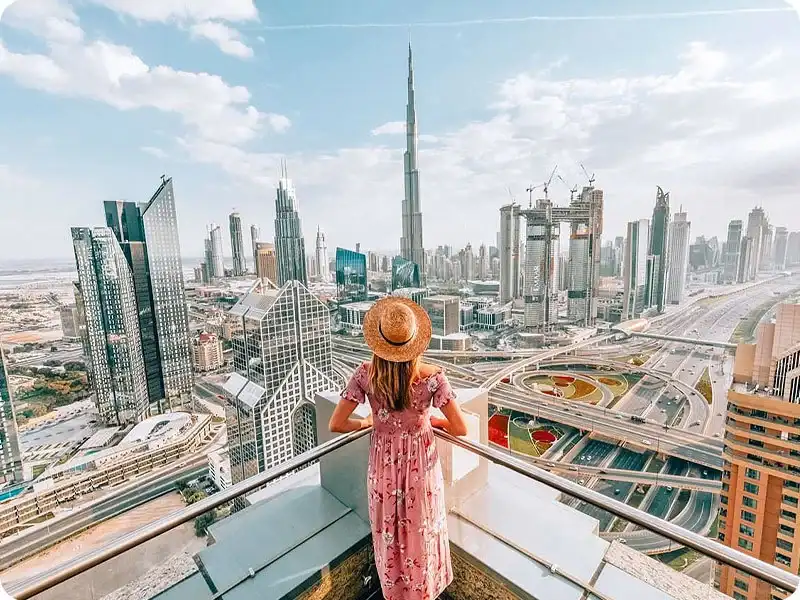
Historical Attractions
Dubai Museum
📍Location: Inside Al Fahidi Fort
The museum showcases the emirate’s transformation from a small fishing village to a global metropolis. It offers a glimpse into the traditional Bedouin way of life with displays of weaponry, musical instruments, and traditional homes.
Al Fahidi Fort
📍Location: Al Fahidi area
Constructed in 1787, it’s the oldest existing building in Dubai. The fort’s structure made from coral blocks and lime stands as a testament to traditional desert architecture.
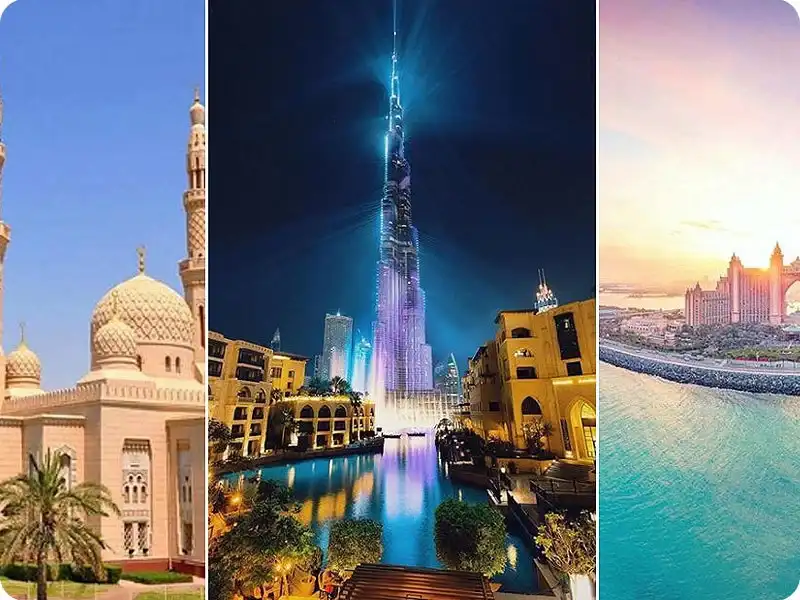
Modern Attractions
Burj Khalifa
📍Location: Downtown Dubai
Standing at 828 meters, it’s the world’s tallest structure. Visitors can take an elevator to its observation decks on the 124th, 125th, and 148th floors for panoramic views of the city.
Dubai Mall
📍Location: Downtown Dubai
One of the world’s largest shopping centers, it houses over 1,200 shops, an aquarium, an indoor ice rink, and multiple dining options.
Dubai Fountain
📍Location: Outside Dubai Mall
A mesmerizing water, music, and light spectacle, it’s one of the world’s largest choreographed fountain systems, shooting water jets as high as 150 meters in the air.
Nature Attractions
Desert Safari
A thrilling adventure that includes dune bashing, camel riding, and sandboarding, and ends with a traditional BBQ dinner under the stars accompanied by live entertainment.
Dubai Creek
This saltwater creek divides Dubai into two main sections – Deira and Bur Dubai. Traditional abra boats offer rides, giving a glimpse of old trading hubs and historical buildings.
Beaches
Dubai boasts pristine sandy beaches. Popular ones include JBR Beach, Kite Beach, and La Mer, each offering distinct vibes and amenities.
Entertainment Attractions
Dubai Parks and Resorts
is The Middle East’s largest integrated leisure and theme park destination spread over 25 million square feet. It includes Motiongate Dubai, Bollywood Parks Dubai, LEGOLAND Dubai, and LEGOLAND Water Park.
Ski Dubai
📍Location: Mall of the Emirates
A unique indoor ski resort with 22,500 square meters of indoor ski area. It offers skiing, snowboarding, and even encounters with penguins.
Cultural Attractions
Jumeirah Mosque
An exquisite example of Islamic architecture, it’s one of the few mosques open to non-Muslims. Guided tours offer insights into Emirati culture and religion.
Dubai Opera
📍Location: Downtown Dubai
A state-of-the-art performing arts center designed in the shape of a traditional sailing vessel. It hosts opera, ballet, concerts, and theatrical productions.
Food and Cuisine: Exploring Dubai’s Gastronomic Delights
In this section, we dive into the rich tapestry of Dubai’s culinary landscape, showcasing the city’s famous dishes and the best spots to savor them.
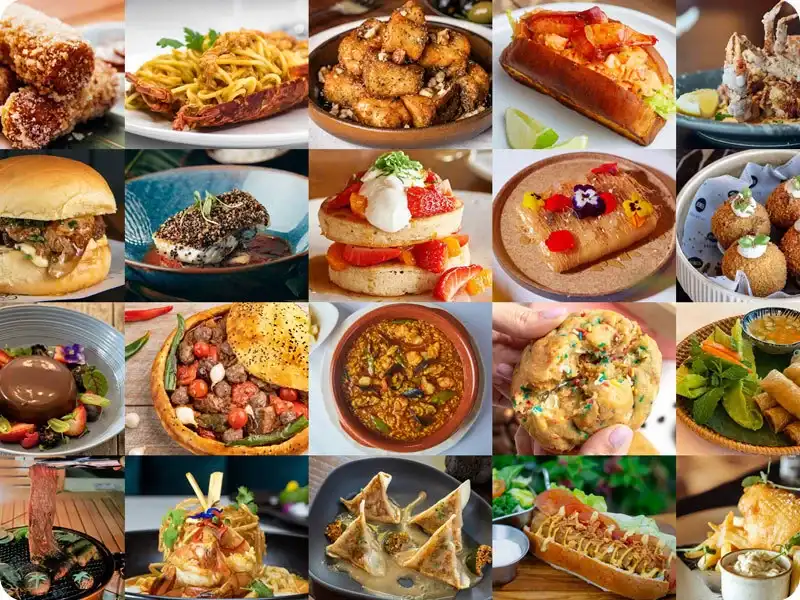
Traditional Dishes
- Shawarma
Shawarma is a popular Middle Eastern dish made by stacking cuts of seasoned meat (like chicken, beef, or lamb) on a vertical spit. As the meat slowly roasts, thin slices are shaved off and served on bread, often with garlic sauce, tahini, pickles, and vegetables.
- Al Harees
A simple yet traditional Emirati dish, Al Harees is known for its minimal ingredients. Made with just meat, wheat, and a pinch of salt, the mix is combined with water in a clay pot and slow-cooked in a traditional oven buried underground. It’s a staple during Ramadan and other festive occasions.
- Falafel
Deep-fried balls made from ground chickpeas or fava beans, seasoned with herbs and spices. Typically served in a pita or flatbread and accompanied by hummus, tahini, and vegetables.
Dining Etiquette
- Use the Right Hand: In Middle Eastern culture, it’s customary to eat with the right hand, especially when consuming traditional dishes or bread.
- Wait to be Served: If you’re dining at someone’s home or in a traditional setting, wait for the host or eldest person to start eating before you begin.
- Respect Ramadan: During the holy month of Ramadan, Muslims fast from sunrise to sunset. Out of respect, avoid eating, drinking, or smoking in public during daylight hours.
- Tipping: A tip of 10-15% is customary in restaurants, but it’s not mandatory. Some establishments might add a service charge to the bill.
Best Areas for Dining
- JBR (Jumeirah Beach Residence):
A bustling waterfront promenade filled with a plethora of restaurants, cafes, and food trucks offering diverse cuisines, from Middle Eastern to Italian and Asian.
- La Mer:
A beachfront destination combining upmarket restaurants, trendy cafes, and boutique eateries, all with a backdrop of the sea and Dubai’s skyline.
- Global Village:
A cultural and entertainment park where different countries showcase their traditions, including food. Here, you can take a culinary journey around the world in one evening.
Dietary Restrictions and Considerations
- Halal: Most meat in Dubai is halal, meaning it’s prepared as per Islamic law. Pork is generally not served except in certain licensed venues.
- Vegetarian/Vegan: Due to its cosmopolitan nature, many restaurants in Dubai offer vegetarian and vegan options. International chains often adapt their menus to suit local preferences.
- Alcohol: Alcohol is available in licensed venues, typically hotels or private clubs. Always consume responsibly and be aware of local customs and regulations.
- Allergies: With a diverse culinary scene, it’s always a good idea to inform restaurant staff about any allergies. Most restaurants are accustomed to adjusting dishes for dietary needs.
Shopping guide and tips
Dubai, often dubbed the ‘shopping capital of the Middle East’, is a paradise for shopaholics. The city flawlessly melds the charm of old-world souks with ultra-modern shopping malls.
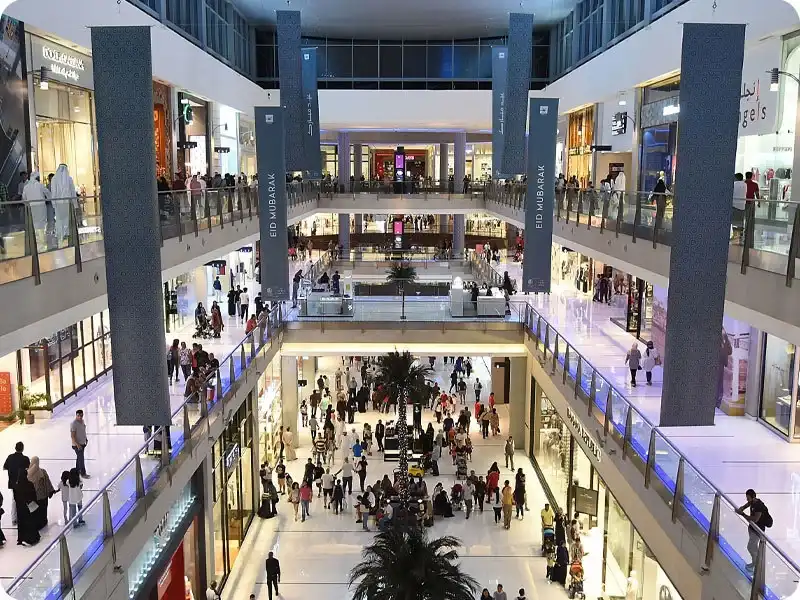
Malls and Shopping Centers
Dubai Mall:
One of the world’s largest shopping malls, it houses over 1,200 stores. From luxury brands like Chanel and Louis Vuitton to high-street names like Zara and H&M, it’s a shopper’s haven.
Unique Features: Besides shopping, the mall boasts the Dubai Aquarium, an indoor ice rink, and a direct view of the Dubai Fountain.
Mall of the Emirates:
A premier shopping destination offering a blend of high-end and mid-range shops.
Unique Features: The mall is home to Ski Dubai, the Middle East’s first indoor ski resort, and offers numerous dining and entertainment options.
Ibn Battuta Mall:
Themed around the travels of the famous explorer Ibn Battuta, this mall takes shoppers on a journey through different countries with its uniquely designed courts.
Unique Features: The mall’s architecture and designs are a visual treat, representing regions like Egypt, China, and India.
Traditional Souks
Gold Souk:
Location: Deira
A historical market offering an astonishing array of gold jewelry. The prices are competitive, and haggling is part of the experience.
Spice Souk:
Location: Deira
A fragrant and colorful market filled with sacks of spices, herbs, incense, and traditional medicinal products.
Textile Souk:
Location: Bur Dubai
A haven for fabric enthusiasts, this souk offers a range of textiles, including silks, cotton, and satins, along with tailoring services.
Local Markets & Pop-Ups
Ripe Market:
A community market promoting local businesses, artisans, and farmers. You can find organic products, handcrafted items, and artisanal food here.
Al Fahidi Historical Neighborhood:
While not a market per se, this restored historic area offers several art galleries, craft shops, and boutique stores.
Shopping Festivals
Dubai Shopping Festival (DSF):
Usually held in January-February, this month-long festival offers massive discounts, daily flash sales, and raffles. It’s accompanied by entertainment events throughout the city.
Dubai Summer Surprises (DSS):
A summer shopping festival providing discounts, in-mall entertainment, and various family-centric activities.
Tax for Dubai tourists
In Dubai, there are no taxes for tourists in this city, but some restaurants include a 10% municipal tax and 10% service fee on their prices.
Tips for Shoppers
- Haggling: In traditional markets like souks, bargaining is customary. Start at half the asking price and work your way up.
- VAT: a 5% VAT is applied to most goods and services. Some tourists might be eligible for a VAT refund at the airport.
- Sales and Discounts: Dubai has periodic sales during festive seasons and special occasions. Keep an eye out for these to get the best deals.
Events and Festivals
Dubai, known for its penchant for grandeur and spectacle, hosts numerous events and festivals year-round, celebrating its diverse culture, global appeal, and vision for the future. Let’s explore some of its most notable events:
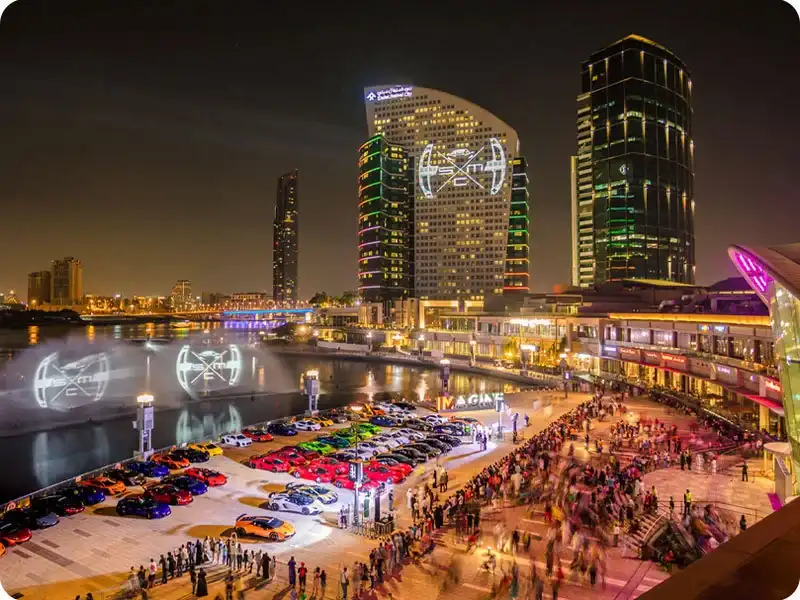
Dubai Shopping Festival (DSF)
Time: Typically held in January-February
A month-long shopping bonanza, the DSF is more than just a retail event. While offering huge discounts across malls and local markets, the festival also features concerts, street performances, fireworks, raffles, and more. It’s a shopper’s dream and a family’s delight, with entertainment catering to all age groups.
Special Highlights: Daily flash sales, raffle draws for luxury cars and gold, family entertainment in malls, and pop-up fashion shows.
Dubai International Film Festival (DIFF)
Time: Usually in December
Celebrating the world of cinema, DIFF is one of the most prestigious film festivals in the Middle East. It showcases a curated selection of films, ranging from international blockbusters to regional cinema and indie productions.
Special Highlights: Red carpet events, celebrity appearances, industry masterclasses, and Q&A sessions with filmmakers. An excellent opportunity for film buffs to get an insight into the global and regional film industry.
Eid Celebrations
Time: Eid celebrations occur twice a year – Eid al-Fitr (at the end of Ramadan) and Eid al-Adha (roughly two months after Eid al-Fitr). The exact dates vary each year based on the Islamic lunar calendar.
Eid is a significant religious holiday for Muslims. In Dubai, it’s marked with grand festivities, feasts, and family gatherings. Malls and public places are decked with lights, and there are fireworks at key locations.
Special Highlights:
Eid al-Fitr: Celebrated at the conclusion of Ramadan, a month of fasting. The day starts with a special prayer, followed by feasts and the giving of gifts. Events, entertainment shows, and special sales were common in malls during this period.
Eid al-Adha: Commemorating the willingness of Abraham to sacrifice his son in obedience to God’s command. It’s marked by the sacrifice of an animal, with the meat being distributed among family, friends, and the less fortunate. Like Eid al-Fitr, this period also saw a range of public events, entertainment, and sales.
Tips for Budget Travelers in Dubai
Uncovers savvy tips for travelers seeking the wonders of Dubai without breaking the bank.
Free and Low-Cost Attractions
- Dubai Creek: Enjoy the old-world charm by taking a stroll along Dubai Creek. Watching the dhows (traditional wooden boats) and absorbing the city’s history is free. For a small fee, you can also take an abra (water taxi) ride across the creek.
- Beaches: Public beaches like JBR Beach and Kite Beach offer free access and have excellent facilities. They’re perfect spots to relax and enjoy Dubai’s skyline.
- Dubai Fountain Show: Situated outside Dubai Mall, the Dubai Fountain offers daily light and music shows in the evenings. It’s free and offers a mesmerizing experience.
- Al Fahidi Historical Neighbourhood: Wander through the historic streets and alleys, getting a glimpse of what Dubai looked like before modernization.
- Ripe Market: Depending on the season, the Ripe Market offers a place to see local artisans and food vendors. Entry is often free, and it provides a pleasant ambiance to relax and people-watch.
Eating on a Budget
- Street Food: Areas like Al Karama and Deira are famous for their array of street food vendors offering dishes like shawarma, falafel, and samosas at very affordable prices.
- Cafeterias: Local cafeterias, often found along the city’s roadsides, offer budget meal options that are both delicious and affordable.
- Eat Where the Locals Eat: Venture away from the tourist-heavy areas and into local neighborhoods for eateries that offer hearty meals at wallet-friendly prices.
- Take Advantage of Meal Deals: Some restaurants, especially in malls, offer lunch specials or combo deals which can be great value for money.
Accommodation Hacks
- Hostels: While Dubai is known for its luxury hotels, there’s a growing number of hostels available that cater to backpackers and budget travelers.
- Serviced Apartments: Opt for serviced apartments or budget hotels in older parts of the city, like Bur Dubai or Deira, which often provide more space for less money.
- Shared Accommodations: Platforms like Airbnb can provide budget options, especially if you’re okay with renting a room rather than an entire apartment.
- Loyalty Programs & Deals: Some hotel chains offer loyalty programs where collecting points can lead to discounted or free stays.
- Travel Off-Peak: Dubai’s high tourist season is during its cooler months, from November to April. By traveling in the off-peak season (keeping in mind it can get very hot), you might find better deals on accommodations.
Useful Resources for Dubai
- Local Apps for Navigation, Dining, and Attractions
RTA Dubai: The official app of Dubai’s Roads and Transport Authority.
Features: Helps with public transport routes, and ticket bookings, and provides real-time updates on public transportation.
Zomato: Widely used in Dubai for restaurant discovery and reviews.
Features: Detailed restaurant menus, reviews, and the ability to order food online.
Time Out Dubai: The app version of the popular city guide magazine.
Features: Listings of events, attractions, dining, nightlife, and more.
DubaiNow: A comprehensive city app that offers a range of services and information.
Features: Bill payments, visa inquiries, health services, and more.
Careem: A popular ride-hailing app in Dubai.
Features: Book taxis or rides, schedule pickups, and track rides in real-time.
- Dubai Calendar for Events and Festivals
Dubai Calendar: The official listing of events, festivals, concerts, and more happening in the city.
Features: Search and filter events by date, category, or location. It also allows ticket bookings for certain events.
Link: www.dubaicalendar.com
Last words
Dubai, often referred to as the jewel of the Middle East, seamlessly merges its rich history with the aspirations of a futuristic metropolis. From the winding alleys of the Al Fahidi Historical Neighbourhood to the towering majesty of the Burj Khalifa, the city offers an all-encompassing experience that promises to leave a lasting impression on every traveler.
As you prepare for your journey or even just dream about a potential visit, always remember that the true essence of Dubai lies not just in its skyscrapers and mega-structures but in its people, traditions, and the stories they carry. Whether it’s your first visit or your tenth, Dubai has a unique way of revealing new facets each time, ensuring your experience is always fresh and exhilarating.
So, pack your bags, keep an open heart, and get ready to immerse yourself in the captivating allure of Dubai. Explore, discover, and most importantly, enjoy every moment in this magnificent desert oasis. Safe travels!
